what kind of batting to use for potholders
Have y'all e'er grabbed a dish towel to have a cookie sheet out of the oven? Would this work as the batting for a pot holder? Maybe y'all made a pot holder and wondered how much batting is really needed, and if the special insulating batting really works. I wondered the aforementioned things and set out to reply these questions and more.
To determine how well different materials insulated, I took my trusty Bar-B-Que temperature probe and iron and measured how the temperature under the potholder increased with time. I used a diverseness of materials; cotton batting, an old stained dish towel, a terry fabric towel from Goodwill, denim from a pair of torn bluish jeans, cotton knit from my husband's worn out undershirt, pieces from an old flannel canvas and Insul-Brite. Insul-Brite is a metallic poly sheet with a thin layer of polyester batting on both sides. It is advertised as an insulating batting for pot holders, oven mitts etc.

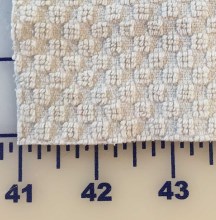


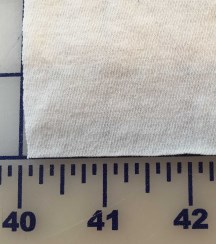


I put the probe under a sandwich of two pieces of cotton cloth and the various battings and put a hot atomic number 26 on elevation. I checked the temperature after fifteen, 30, 45 and 60 seconds. The results of the first round of testing is in the nautical chart below. I then sewed up a variety of pot holders and retested the time, in case the quilti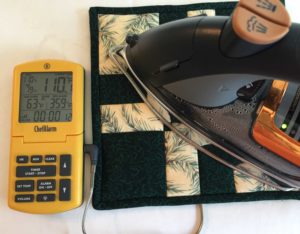 ng made a difference. It didn't. I then wanted to give them a more practical test, and then I put my manus underneath the pot holder and hot atomic number 26 on tiptop. I timed how many seconds before I had to pull my hand abroad. I know that using my hand isn't the about scientific method, but it gave some interesting results. For case, the 4 layers of tee-shirt fabric with Insul-Brite in the heart got unbearably hot much more quickly than I would have guessed based on temperature alone. I have added these results in the last column of the chart and called it "Hot Time".
ng made a difference. It didn't. I then wanted to give them a more practical test, and then I put my manus underneath the pot holder and hot atomic number 26 on tiptop. I timed how many seconds before I had to pull my hand abroad. I know that using my hand isn't the about scientific method, but it gave some interesting results. For case, the 4 layers of tee-shirt fabric with Insul-Brite in the heart got unbearably hot much more quickly than I would have guessed based on temperature alone. I have added these results in the last column of the chart and called it "Hot Time".
It seems that "fluffiness" is the disquisitional factor in providing protection for your hands. The air trapped in the fabric of the batting and terry cloth provide more insulation. To prove this definitively would require more work than I am ready to commit to this projection, merely my determination is that fabric like tee-shirts and denim are more densely woven and carry the rut to your fingers more apace. The dish towel that I sacrificed for this study was not only ugly and stained, but threadbare. I recollect that a thicker towel would have performed better.
If your pot holder is mostly decorative, or you are just going to utilize 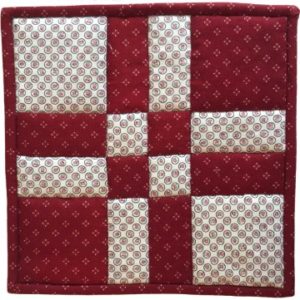 it as a trivet for items that are only a little besides warm for your table top, don't worry about the batting, use anything you desire. If it is going to get a lot of bodily oven apply, I would suggest going thicker. I have taken a goulash out of the oven and only then noticed that all the trivets were in employ and it took me several seconds to discover a place to fix it downwards. The last thing you want is for your fingers to start burning while holding a full pan of ground beef, noodles and tomato sauce. I would recommend that y'all utilise at least two layers of batting cloth. Either towels or cotton batting or a combination of batting and Insul-Brite.
it as a trivet for items that are only a little besides warm for your table top, don't worry about the batting, use anything you desire. If it is going to get a lot of bodily oven apply, I would suggest going thicker. I have taken a goulash out of the oven and only then noticed that all the trivets were in employ and it took me several seconds to discover a place to fix it downwards. The last thing you want is for your fingers to start burning while holding a full pan of ground beef, noodles and tomato sauce. I would recommend that y'all utilise at least two layers of batting cloth. Either towels or cotton batting or a combination of batting and Insul-Brite.
What about Insul-Brite? Well, it absolutely works. It volition keep your fingers 5⁰ to 10⁰ cooler or most and actress 5 to x seconds of conveying time. Delight be aware that the instructions say to continue a layer of batting betwixt the Insul-Brite and the estrus source. They aren't kidding. The fuzzy stuff on either side of the foil is polyester. Run into in the movie how the iron left a mark after 60 seconds. The Insul-Brite wasn't fifty-fifty directly touching the iron, information technology was betwixt two layers of cotton fiber fabric. The foil layer means that this is not microwave prophylactic, so go on that in mind for projects like insulated bread warmer baskets. It also makes a soft crinkling sound when aptitude. Used correctly, it is a swell product and I would recommend it if you were very concerned almost temperature. It isn't absolutely necessary though, and so don't let a lack of this product prevent you from sitting down at your sewing machine.
the estrus source. They aren't kidding. The fuzzy stuff on either side of the foil is polyester. Run into in the movie how the iron left a mark after 60 seconds. The Insul-Brite wasn't fifty-fifty directly touching the iron, information technology was betwixt two layers of cotton fiber fabric. The foil layer means that this is not microwave prophylactic, so go on that in mind for projects like insulated bread warmer baskets. It also makes a soft crinkling sound when aptitude. Used correctly, it is a swell product and I would recommend it if you were very concerned almost temperature. It isn't absolutely necessary though, and so don't let a lack of this product prevent you from sitting down at your sewing machine.
If you lot want this quilt to be used as a trivet for very hot items, so look to how the products hold up 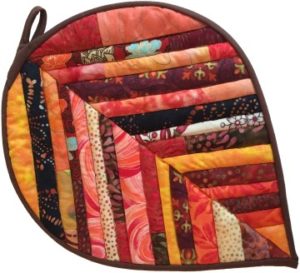 afterwards 60 seconds. According to Wilson Art, a manufacturer of laminate counter tops (similar to Formica), their glue can start to soften at 200 ⁰F and you should avoid prolonged contact greater than 150 ⁰F. Corian, solid surface counter tops, say their product can withstand 300 ⁰F. Only other web sites say you should keep the temp. below 212 ⁰F. Wood will char at 248 ⁰F only the finish can exist affected by much lower temperatures. I have seen a table's finish marred by the moisture and warmth of a delivery pizza box. There is no exact number, but my best estimate is that you would desire to keep the 1 minute temperature at or beneath 140 ⁰F. I know that you bring things out of the oven as hot equally 450 ⁰F, but realize that the pan is starting to cool every bit soon equally information technology hits the room temperature air. And then, while the lesser of the pot holder is getting warmer over time, the pan or dish is getting libation over time. If you are really concerned, then become with a triple layer, information technology will keep the temperature beneath 130 ⁰F. The triple layer items are similar to the commercial pot holder which I have used for many years and never had it burn my fingers or marker my tabular array.
afterwards 60 seconds. According to Wilson Art, a manufacturer of laminate counter tops (similar to Formica), their glue can start to soften at 200 ⁰F and you should avoid prolonged contact greater than 150 ⁰F. Corian, solid surface counter tops, say their product can withstand 300 ⁰F. Only other web sites say you should keep the temp. below 212 ⁰F. Wood will char at 248 ⁰F only the finish can exist affected by much lower temperatures. I have seen a table's finish marred by the moisture and warmth of a delivery pizza box. There is no exact number, but my best estimate is that you would desire to keep the 1 minute temperature at or beneath 140 ⁰F. I know that you bring things out of the oven as hot equally 450 ⁰F, but realize that the pan is starting to cool every bit soon equally information technology hits the room temperature air. And then, while the lesser of the pot holder is getting warmer over time, the pan or dish is getting libation over time. If you are really concerned, then become with a triple layer, information technology will keep the temperature beneath 130 ⁰F. The triple layer items are similar to the commercial pot holder which I have used for many years and never had it burn my fingers or marker my tabular array.
My next question was how difficult would it be to quilt a potholder with thicker and thicker batting. My Bernina didn't have whatever problem with 3 layers of cotton fiber, but the final trim was a niggling difficult with my rotary cutter. I used an open toed pes, a walking human foot and the gratis motion foot and didn't have any problem with any of them. The triple layer of terrycloth towel, shown below, just barely fit nether the open toe presser foot on the Bernina Artista 165.
To become to the center of the piece with the walking foot, I had to lower the feed dogs. There was plenty of room under the free motility foot. Once in place I had no trouble sewing through all the layers of fabric with any of the anxiety. I checked very carefully and only plant 1 skipped stitch. It is worth noting however that the sandwich was and then thick that the free motion human foot didn't appear to motility upwards and down, just I was nonetheless able to move the fabric back and forth. In that location was also plenty of space under all of the anxiety on my Bernina B740. The real problem was using the rotary cutter for the concluding trim before calculation the binding. I accept three rotary cutters, a Gingher, an OLFA and a Fiskars. Only the Fiskars had enough space between the edge of the bract and the center holder to be able to cut through all the layers. Cut the layers with pair of scissors was ho-hum and difficult until I pulled out my great hacking 10" Gingher Dressmaker Shears.
In conclusion, almost any scrap cotton items y'all have lying around will work fine for a decorative pot holder or one that only gets lite duty. Cotton wool batting and towel material work best and you can add Insul-Brite to requite it a little boost.  My personal selection depends on whether this is for a gift or if I am going to use it myself. If I am giving this as a gift, I would use either 2 layers of terry cloth (anest choice) or 2 layers of cotton batting, depending on what I had on hand. I wouldn't utilize the Insul-Brite because some people may not like the crinkly audio. For myself, I beloved the idea of turning an erstwhile ugly dish towel into something new and beautiful. I use 2 layers of dish towel with a layer of Insul-Brite in the middle. I don't mind the sound and the actress insulation protects these quilting fingers.
My personal selection depends on whether this is for a gift or if I am going to use it myself. If I am giving this as a gift, I would use either 2 layers of terry cloth (anest choice) or 2 layers of cotton batting, depending on what I had on hand. I wouldn't utilize the Insul-Brite because some people may not like the crinkly audio. For myself, I beloved the idea of turning an erstwhile ugly dish towel into something new and beautiful. I use 2 layers of dish towel with a layer of Insul-Brite in the middle. I don't mind the sound and the actress insulation protects these quilting fingers.
So, before y'all throw abroad that sometime dish towel, embankment towel or bath towel, call up about giving it new life with some left-over fabric and a little imagination.
Don't miss next month'due south newsletter, information technology includes a free design!
| Clarification | Thick inches | Thick mm | Temp 15 sec | Temp 30 sec | Temp 45 sec | Temp 60 sec | Hot Fourth dimension sec |
| No Batting, ii pieces of cotton fiber fabric | 0.02 | 0.51 | 139 | 160 | 203 | 245 | |
| Double Layer Tee Shirt | 0.055 | one.397 | 135 | 148 | 156 | 175 | |
| Single Layer Blueish Jeans | 0.062 | 1.57 | 125 | 164 | 198 | 233 | |
| Single Layer Cotton Batting | 0.066 | 1.67 | 126 | 142 | 161 | 185 | 14 |
| Single Layer Insul-Brite | 0.067 | 1.7 | 115 | 136 | 156 | 177 | |
| Unmarried Layer Old Dish Towel | 0.082 | 2.08 | 130 | 151 | 160 | 183 | |
| 2 Layers Blueish Jeans | 0.088 | 2.24 | 107 | 145 | 158 | 165 | |
| 2 Layers Cotton Batting | 0.091 | 2.31 | 114 | 129 | 137 | 144 | 35 |
| Unmarried Layer Terry Fabric Towel | 0.096 | 2.44 | 125 | 145 | 152 | 161 | |
| 4 Flannel Sheets | 0.1 | 2.54 | 115 | 138 | 150 | 160 | |
| 4 Cotton wool Tee Shirt | 0.102 | 2.59 | 116 | 143 | 152 | 157 | |
| Cotton fiber Batting on Top Foil on Bottom | 0.105 | two.67 | 108 | 123 | 135 | 149 | 40 |
| Foil on Top Cotton Batting on Bottom | 0.105 | two.67 | 109 | 126 | 140 | 154 | |
| 6 Layers Tee Shirt, no outer fabric | 0.112 | 2.84 | 106 | 133 | 146 | 157 | |
| 2 Layers Old Dish Towel | 0.12 | 3.12 | 106 | 131 | 140 | 148 | 24 |
| half dozen Layers Tee Shirt | 0.134 | 3.4 | 95 | 124 | 135 | 141 | |
| 2 Blue Jeans Insul-Brite in the Middle | 0.137 | 3.48 | 109 | 132 | 141 | 147 | |
| four Flannel Sheets Insul-Brite in the Middle | 0.xv | 3.81 | 100 | 127 | 135 | 140 | |
| four Cotton Tee Shirt Insul-Brite in the Middle | 0.152 | 3.86 | 98 | 124 | 132 | 138 | 25 |
| 2 Layers Terry Textile Towel | 0.163 | 4.14 | 93 | 124 | 134 | 140 | 40 |
| 8 Layers Flannel Sail | 0.183 | 4.65 | ninety | 120 | 135 | 141 | |
| 2 Cotton Insul-Brite in the Middle | 0.186 | iv.72 | 92 | 113 | 118 | 124 | 55 |
| Triple Cotton wool Batting | 0.188 | 4.78 | 100 | 119 | 123 | 129 | 49 |
| Triple Dish Towel | 0.193 | 4.90 | 86 | 109 | 125 | 135 | 35 |
| ii Dish Towel Insul-Brite in the Middle | 0.199 | 5.05 | 88 | 113 | 126 | 131 | 45 |
| 2 Terry Towel Insul-Brite in the Eye | 0.25 | six.35 | 81 | 101 | 118 | 128 | |
| Triple Terry Towel | 0.274 | 6.96 | 80 | 101 | 119 | 128 | 85 |
| Commercial Pot Holder | 0.281 | 7.fourteen | 88 | 112 | 128 | 138 | 65 |
All Temperatures are in degrees Fahrenheit.
Don't the side by side newsletter

Source: https://questioningquilter.com/2018/01/02/what-is-the-best-batting-for-a-pot-holder/
0 Response to "what kind of batting to use for potholders"
Postar um comentário